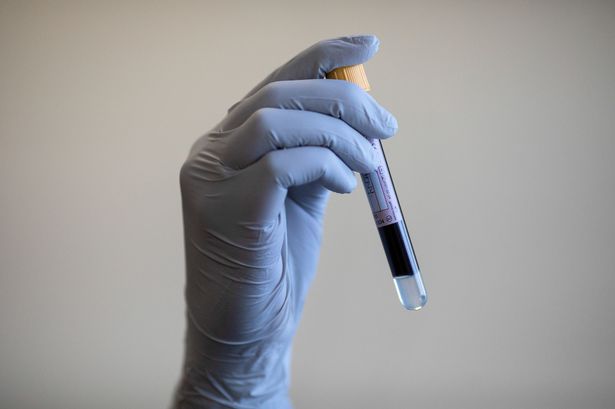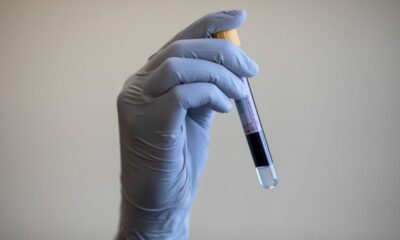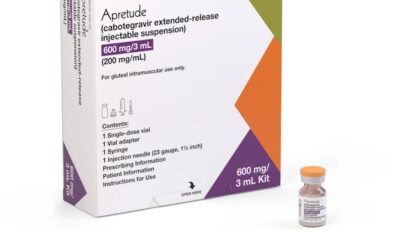Science
Revolutionary Blood Test for Cancer Detection Trials Show Promise

A groundbreaking blood test designed to detect over 50 types of cancer is currently undergoing trials within the NHS. The Galleri test identifies fragments of DNA in the bloodstream that cancer cells shed, offering a potential new approach to early cancer detection. Recent findings indicate that the test correctly identifies cancer in approximately 62% of cases where it suspects the disease may be present.
The Galleri test, which can be administered annually, looks for the unique “fingerprint” of various cancers, often unveiling signs of the disease before symptoms manifest. In a significant trial led by Grail, the test demonstrated a high efficacy rate in ruling out cancer for individuals who are cancer-free. According to the results from the Pathfinder 2 study, 61.6% of participants who tested positive for a cancer signal were later diagnosed with the disease. Moreover, the test accurately identified the origin of the cancer in 92% of cases, potentially streamlining the diagnostic process and reducing the need for unnecessary scans and tests.
Notably, the Galleri test detected that more than half (53.5%) of the cancers identified were at the earliest stages (I or II), and over two-thirds (69.3%) were diagnosed at stages I through III. While not a treatment for cancer, early detection can open the door for less invasive and more effective treatment options.
The test also holds significant advantages for those who do not have cancer. It correctly ruled out the presence of the disease in 99.6% of participants who tested negative, thereby saving both time and financial resources on further testing.
The findings are being presented at the European Society for Medical Oncology (ESMO) Congress in Berlin. Sir Harpal Kumar, president of International Business and BioPharma at Grail and former head of Cancer Research UK, expressed enthusiasm regarding the results, stating, “We’re really very excited and we think this is a further step along the way in really transforming cancer outcomes.”
The study explored the potential of the Galleri test in a real-world setting, suggesting that integrating it into existing cancer screening programs, such as those for breast and bowel cancer, could lead to a more than seven-fold increase in cancers detected within a year. Specifically, the test identified a cancer signal in 216 individuals, of whom 133 were subsequently diagnosed with cancer.
Further research on the effectiveness of the NHS Galleri trial, focusing on its implementation in screening asymptomatic individuals, is anticipated to be published in mid-2024. Sir Harpal noted, “Assuming we do get positive results from NHS Galleri, the opportunity to find substantially greater numbers of cancers before they present clinically means we should be able to find a lot more of them at an earlier stage.”
Modeling suggests that the Galleri test could be particularly effective as an annual screening for individuals aged 50 and above, as cancer incidence significantly increases in this age group. Sir Harpal remarked that while the test is mainly aimed at older populations, younger individuals with a history of cancer or genetic predispositions could also benefit.
Research published in the journal BMJ Open earlier this year indicated that using an annual blood test for cancer could lead to 49% fewer late-stage diagnoses and 21% fewer cancer-related deaths within five years compared to standard care practices. As trials continue and further studies emerge, the Galleri test may represent a transformative shift in cancer screening and treatment.
-

 Entertainment2 months ago
Entertainment2 months agoAnn Ming Reflects on ITV’s ‘I Fought the Law’ Drama
-

 Entertainment3 months ago
Entertainment3 months agoKate Garraway Sells £2 Million Home Amid Financial Struggles
-

 Entertainment2 months ago
Entertainment2 months agoCoronation Street’s Carl Webster Faces Trouble with New Affairs
-

 Health1 month ago
Health1 month agoKatie Price Faces New Health Concerns After Cancer Symptoms Resurface
-

 Entertainment1 month ago
Entertainment1 month agoWhere is Tinder Swindler Simon Leviev? Latest Updates Revealed
-

 Entertainment3 months ago
Entertainment3 months agoKim Cattrall Posts Cryptic Message After HBO’s Sequel Cancellation
-

 Entertainment2 months ago
Entertainment2 months agoMasterChef Faces Turmoil as Tom Kerridge Withdraws from Hosting Role
-

 Entertainment3 months ago
Entertainment3 months agoSpeculation Surrounds Home and Away as Cast Departures Mount
-

 World1 month ago
World1 month agoCole Palmer’s Mysterious Message to Kobbie Mainoo Sparks Speculation
-

 Entertainment2 months ago
Entertainment2 months agoITV’s I Fought the Law: Unraveling the True Story Behind the Drama
-

 Entertainment1 month ago
Entertainment1 month agoCaz Crowned Winner of The Great British Sewing Bee, Overjoyed by Triumph
-

 Entertainment3 months ago
Entertainment3 months agoMarkiplier Addresses AI Controversy During Livestream Response





















